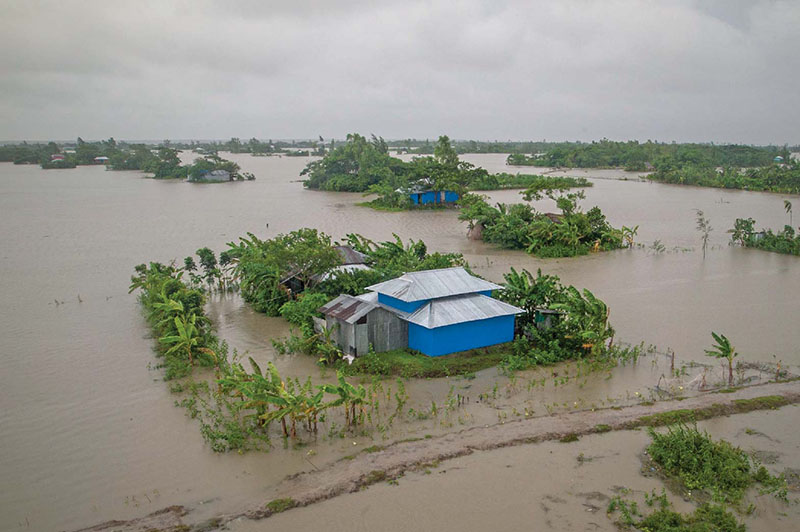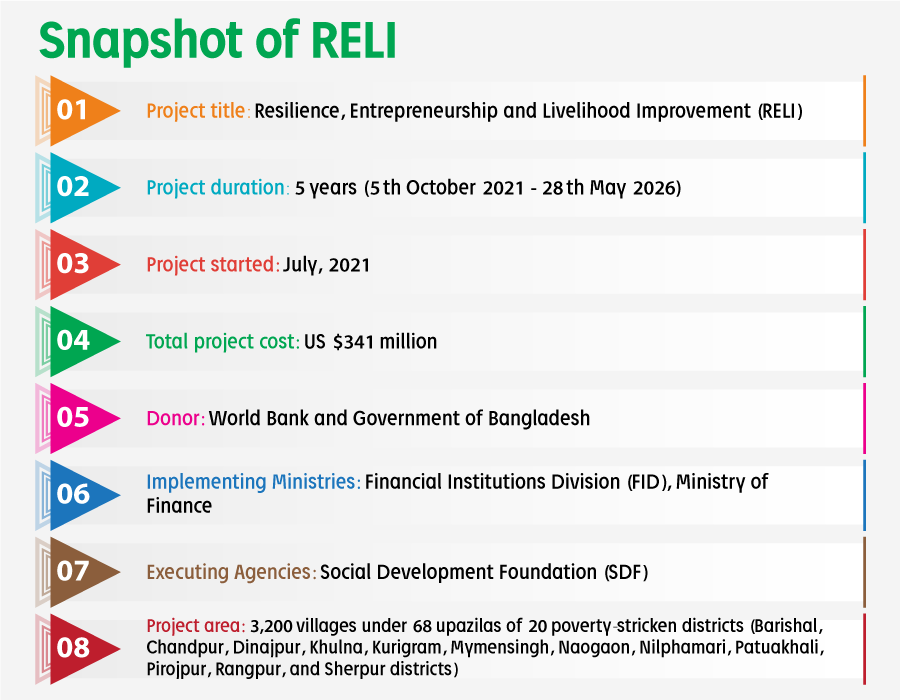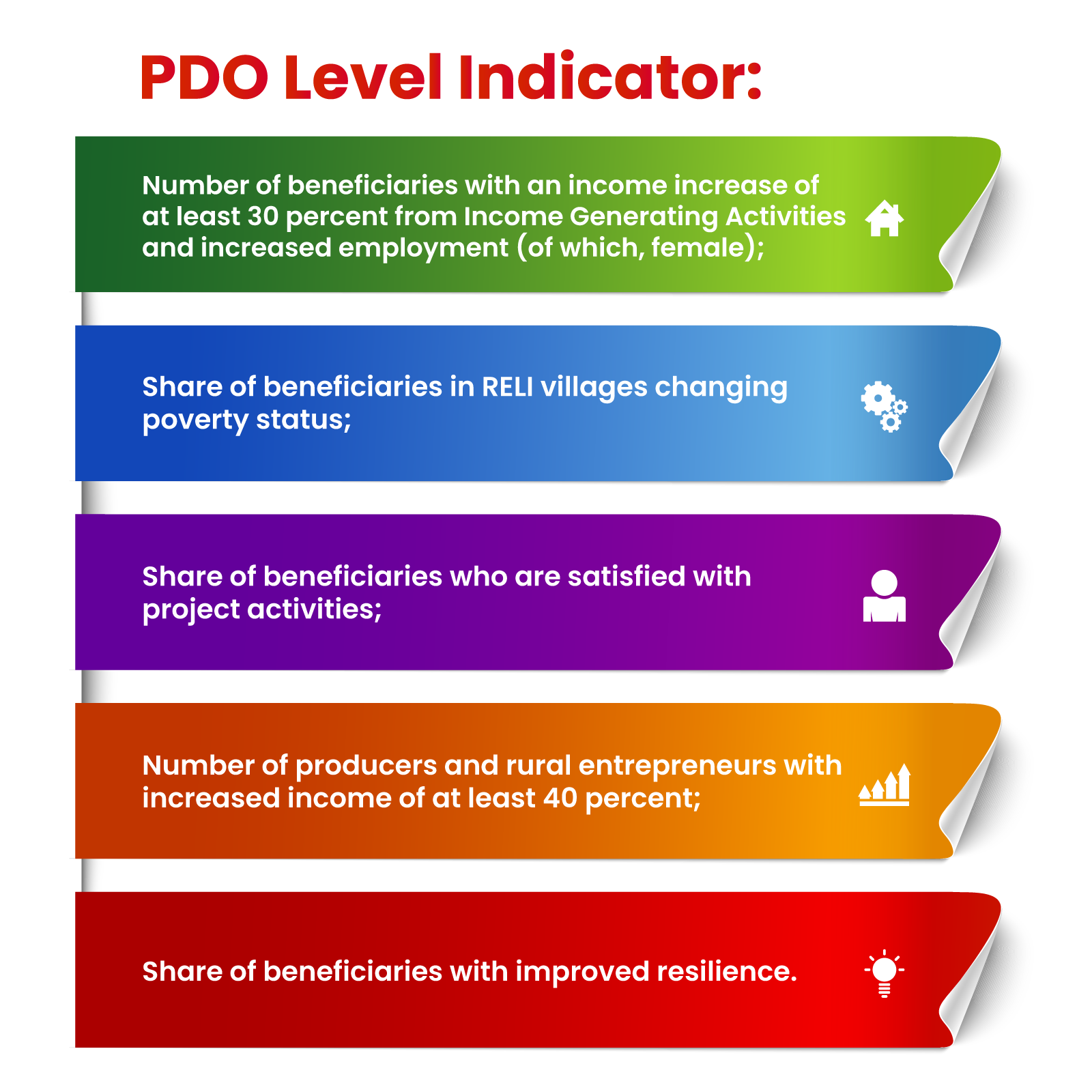
Resilience, Entrepreneurship, and Livelihood Improvement (RELI) Project
Participation, interaction, and mobilization are some of the important guiding principles of SDF’s project implementation strategies toward building a society free from deprivation, discrimination, and poverty. SDF started implementing the RELI Project to predominantly address the emergency economic initiatives of the Government of Bangladesh to fight the COVID-19 crisis and climate-induced events, the RELI Project was adopted to focus on livelihood support for the vulnerable people and support their recovery and resilience-building, employment generation, entrepreneurship development, and post-crisis economic recovery preparation in the intervening areas. The project builds on the successful experience of rural poverty alleviation achieved by its predecessor projects--Social Investment Program Project-I and II, and Nution Jibon Livelihood Improvement Project (NJLIP). Evaluations of past World Bank-supported community-driven development (CDD) projects confirmed that they significantly contributed to achieving rural development and poverty reduction. As the RELI’s approach to livelihood improvement support to the rural poor and extreme poor is essentially similar to that of NJLIP, most project activities of RELI Project have been adjusted to provide a timely and effective response to the disruptions created by the COVID-19 pandemic, to support post-crisis economic recovery, and to ensure greater resilience of beneficiaries.


| Area selection | : | Poverty-prone areas as identified by HIES 2016 |
|---|---|---|
| Coverage | : | 3200 villages in 20 poverty-prone districts |
| Target Beneficiaries | : | The RELI Project included over 744,600 Poor and Extreme Poor House Holds (HHs) |
| Budget | : | US$ 341 million (US$ 300 million is being provided by the International Development Association (IDA), US$ 40 million as counterpart funds from the Government of Bangladesh whilst US$ 1 million is from the local beneficiaries as matching grants) |
| Components | : |
|
Regions & District
| Region | District |
|---|---|
| Barishal | Barishal, Patuakhali, Pirojpur, |
| Cumilla | Chandpur, Chattogram, Laksmipur |
| Jashore | Chapainababganj, Jhenaidah, Khulna, Magura, Naogaon, |
| Mymensingh | Kishoreganj, Mymensingh, Netrokona, Sherpur |
| Rangpur | Dinajpur, Kurigram, Lalmonirhat, Nilphamari, Rangpur |
Institution Building (IB)
43,079 RELI Groups (RG) have been formed;
576,573 RG members have been included in the group of which 41,590 are youths
Institution Building is the main vehicle of underprivileged people’s empowerment propels. SDF is mobilizing the excluded extreme poor and poor focusing on women and youth to build accountable, inclusive, and transparent village institutions. These institutions tend to be multipurpose institutions adapting to the emerging challenges of a changing society on economic development and women empowerment. The community has been bringing together all the extreme poor and poor in the villages under RELI Groups (RGs), setting up their village-level institutions and providing financial and technical assistance to the group members for starting income generating activities. SDF strives to empower women while making communities, especially village institutions, more sustainable.
Livelihood Development
224,201 members started Income Generating Activities (IGAs)
241,439 loans disbursed for starting IGAs.s
264,826 members received skill development training on different IGAs
SDF works to achieve economic and social changes in ultra-poor households, assist them in accessing mainstream development programs, and create aspirations among severely disadvantaged groups. Through the Livelihood Development program, SDF bridges the gap between their aspiration and action to translate the target into reality. We are focusing on the unmet needs of the poor and extreme poor, especially women, including areas of extreme deprivation, protecting the rights of the poor. SDF provides financial, market, technical, value chain, and business development support to the rural poor community to upgrade their lives and livelihoods.
One-time Grant (OTG) to Vulnerable
129,325 vulnerable people received One-time Grants;
91,112 vulnerable people started small scale Income Generating Activities (IGAs);
Vulnerable people refer to those who need special care, support, or protection because of their age, disability, or mistreatment or neglect etc. as determined by the communities in each village according to set criteria defined by the project. The One-time Grants and subsequent awareness programs are started for implementation once identification is completed, pushing the vulnerable people forward to be mainstreamed in society. They invest a substantial portion of the amount in micro-scale IGAs. Gradually many of them become members of Gram Parishad, start savings and take RF loans to scale up their IGAs.
Community Finance
576,573 beneficiaries including youths have started savings;
107,559 borrowers (RG members) received Internal Loan;
231,493 borrowers (RG members) received Revolving (Sabolombi) loan;
In our holistic approach to poverty alleviation, we see Community Finance as one of the essential tools to address the root causes of poverty. In addition to providing access to finance, we ensure that our borrowers are supported, can exchange information, and raise their level of awareness on empowerment, employment, health, and social issues. This innovative, client-focused, and sustainable, program is a critical component of our holistic approach to support livelihoods. Receiving credit on a reasonable payable service charge to meet the recurring expenses and maintaining the growth of funds to the VCO, they are getting involved in different income-generating activities and thus turning their lives towards financial and social empowerment
Savings Matching Grants (SMG)
502,911 poor and extreme poor beneficiaries received savings matching grants.
Savings Matching Grants are provided to RELI group members in each village covered by the RELI Project to provide financial assistance against their savings. This contributes to the saving attitude of the beneficiaries. If a beneficiary deposits BDT 100 per month, the member is given BDT 100 as financial assistance (grant) against this savings.
Construction works (CW)
1,536 Gram Samiti (GS) office building constructions completed;
A road network has been created by building 18.79 km HBB/BFS road in project villages;
172 culverts were constructed in the project villages;
2,498 Tube-wells installed for ensuring pure drinking water;
1,082 Solar panels with lamp posts were installed;
473,863 populations have benefited through the infrastructure development.
The tangible achievements of infrastructure projects have been fostering economic opportunities creating employment prospects and promoting community institutions. Working hand-in-hand with communities to build or improve local, small-scale infrastructures such as the construction of village institution's office buildings, roads, culverts, U-drains, repairing schools, installation of water distillation/desalination systems are intrinsic to Construction Work Fund’s(CWF) social and economic development activities. This program has been furnishing services at the community level to promote income or employment generation associated with skill development.
Environment and Social Risk and Mitigation:
336,598 beneficiaries received training on “Climate risk, adaptation and resilience building
91,602 beneficiaries are aware about environmental issues
The activities related to Environment and Social (E&S) risk in occupation, community health and safety, water, air, and soil pollution, solid waste management, sexual exploitation, and abuse (SEA)/Sexual Harassment (SH), adolescent girl early marriage, etc. started to assess and take appropriate measures accordingly. Ensuring appropriate benefits to marginalized and disadvantaged groups including indigenous peoples, the project deals with issues like child labor risk, women's labor, gender disparity, and project-related grievance. All project beneficiaries are scheduled to be trained on climate risk, adaptation, and resilience building.
YOUTH EMPLOYMENT GENERATION SUPPORT (YEGS)
14,683 youth received skill development training on different trades-based professions;
10,735 youth have been employed;
In the youth employment sector, the SDF’s role in Bangladesh’s progress is significant. Our well-managed and well-resourced Youth Employment Generation Support (YEGS) program has been sailing ahead constantly to materialize commitment and endeavors tied to specific targets for reducing development disparities. The objective of this program is to build the capacity through skill development training in 32 trades of the un/underemployed youths (jobless migrants/immigrant returnees, including climate migrants) along with job placements for socio-economic elevation. We strive to enhance employment opportunities through apprenticeships, institution-based training, and enterprise development. To this end, a good number of partnerships with different institutions have already been established including the Department for Youth Development (DYD) and other potential organizations.
Study Support Grant
640 students received stipend for higher studies;
Study Support Grant was introduced for highly deserving meritorious students of beneficiary families who have completed their Higher Secondary Certificate examination and struggling to start their higher studies at universities or professional institutions for inadequate financial support.
Health and Nutrition Support (HNS)
9,515 Health and Nutrition Support Committee members received training on Health & nutrition;
53,539 BCC sessions have been conducted where 490,450 participants attended.
2,450 Health camps have been organized where 233,266 patients get treatment;
10,406 mothers (pregnant & lactating mothers) received maternal allowance;
719 mothers received caesarean allowance;
In response to recognizing the current scenario of deaths, diseases, and the demographic and epidemiological transition in Bangladesh, SDF emphasized the importance of expanding public health programs, enhancing the skills of the community health workforce, improving the quality of services, and addressing the equity in health care services through Health and Nutrition Support (HNS) program. These are the activities being implemented by the Health and Nutrition Support Committee (HNSc) under Nutrition Awareness and Support Service (NASS): i. Promote infant and child feeding practices complemented with maternal allowances, ii. raise awareness of the spread of infectious, vector-borne, and water-borne diseases; iii. strengthen links between communities and government and non-government health providers; iv. Raise awareness of gender-based violence; and v. encourage crop diversification, complemented with seed distribution. This program will provide health and nutrition support to 5,44000 household family members.
Capacity Building (CB)
1,721 staffs and 160,363 RG members received training on different skill development;
879,317 community members have been trained on project guideline and income generating activities;
SDF values efficiency and excellence in all our work, constantly changing ourselves to perform better, meet and exceed program targets, and improve and deepen the impact of our interventions. The Capacity Building Cell is responsible for augmenting the capacity and professionalism of SDF employees and program participants through a wide range of human development initiatives. This unit is providing orientation continuously aligning its objectives not only with the national goals but also considering the Sustainable Development Goals(SDGs).
Governance and Accountability (G and A)
The Governance and Accountability (G and A) program of SDF has significant and effective roles in keeping the project on the right track to reach the desired destination. We strongly believe that governance needs to be compatible with challenges, and changes and adaptively respond to emerging risks and opportunities. This program is well equipped with i. Governance and Accountability Plan (GAAP); ii. Social Audit Committee (SAC); iii. Community Assessment Process (SAC); iv. Integrity Committee, and v. Information Disclosure Policy (IDP). This program is grounded in the understanding that the core challenges associated with sustainable development are addressed properly through governance and accountability mechanisms to contribute immensely to achieving intended goals and objectives.